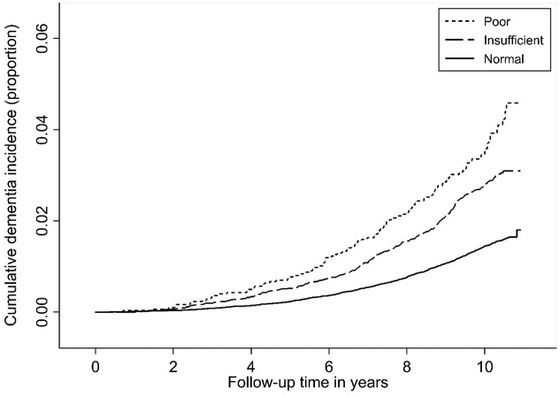Research results show that 'people who cannot hear people in a noisy environment' are at high risk of dementia

In a cafeteria or other environment with many people, you may not be able to hear what the other person is saying due to the noise around you. A new study of more than 80,000 elderly people over the age of 60 found that 'people who have difficulty hearing in a noisy environment are at high risk of dementia.'
Speech-in-noise hearing impairment is associated with an increased risk of incident dementia in 82,039 UK Biobank participants --Stevenson ---- Alzheimer's & Dementia --Wiley Online Library
Can't Hear People When There's Noise Around? New Study Links This to Dementia Risk
https://www.sciencealert.com/struggling-to-hear-speech-in-noisy-rooms-linked-to-dementia-risk
By 'ear-boggling take a year' is a fact known to the general, hearing loss is the world five major medical journal Lancet, which is known as to the 'main risk factors 12 election deal possible dementia' raise It is said that it is closely related to dementia. According to the Lancet, deafness has the strongest effect on dementia among the 12 major risks, and it is estimated that if middle-aged and older people with deafness are not treated, they are about five times more likely to have dementia. I am.

To deepen the discussion of the relationship between deafness and dementia, Jonathan Stevenson and colleagues at Oxford University and colleagues have large-scale and long-term effects of various environmental exposures and genetic predispositions on disease, including nutrition, lifestyle, and drug therapy. An analysis of 82,039 elderly people aged 60 and over who had no dementia and no hearing problems at the start of the study, based on the
A UK Biobank study included a test called 'speech-in-noise' in which people listened to conversations in noise, and examined the relationship between the results of this speech-in-noise and dementia. , 'People with poor speech-in-noise results have a higher incidence of dementia.' The following is a graph of the relationship between the number of years elapsed and the incidence of dementia for each speech-in-noise result. Comparing subjects belonging to 'Poor' with the worst speech-in-noise results with 'Normal' with the best results, Poor subjects have twice the incidence of dementia after 10 years compared to Normal. Is shown.

Stevenson et al. Conducted an analysis to eliminate the theory that 'undetected dementia may cause deafness,' but did not obtain results in support of this theory. The study also analyzed relationships such as social isolation and depression, which are generally said to be associated with hearing loss, but according to Stevenson et al., 'Hearing loss is associated with social isolation and depression. There was little evidence that it was related. '
Research institutes in Australia and Taiwan have also published research results that deafness is a risk factor for dementia, but these studies have set a self-reported evaluation standard for deafness, according to Stevenson et al. It's different. According to the UK Biobank database, 53.4% of the subjects who belong to 'Insufficient' who have a slightly bad result of speech-in-noise, and 43.8% of the subjects who belong to 'Poor' who have a bad result are 'deafness'. I wasn't aware of it. '
Hearing aids may improve the risk of dementia because hearing aids are considered a 'responsible risk' in the Lancet study, but the results obtained in existing studies are consistent. There is no sex. Stevenson and colleagues said, 'This analysis shows that hearing aids reduce the risk of dementia, but they are not significant as a test due to the small sample size, and hearing aid users suffer from particularly severe deafness. Considering that there is a high possibility of receiving other treatments, it is difficult to calculate with the current research method. '
Related Posts:
in Science, Posted by darkhorse_log







